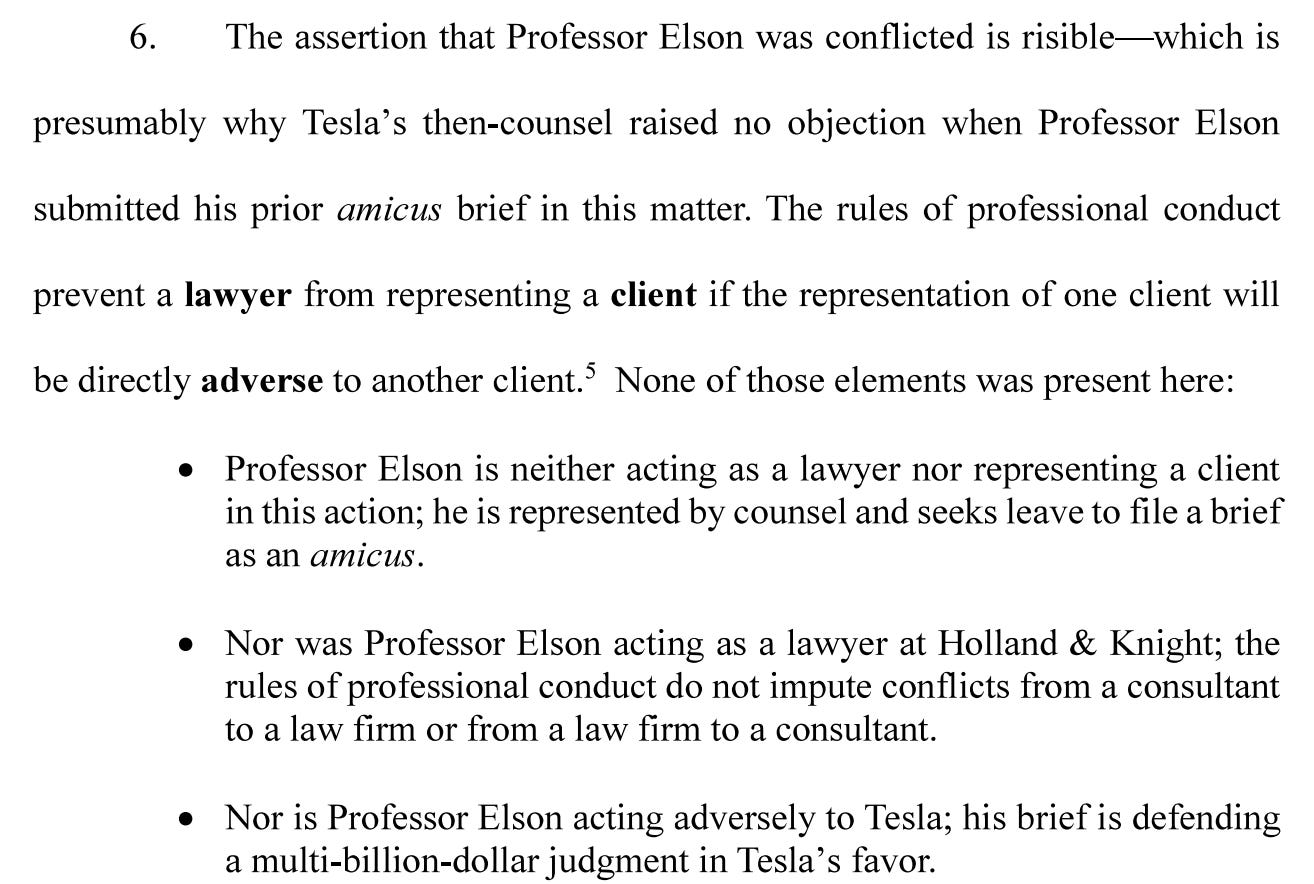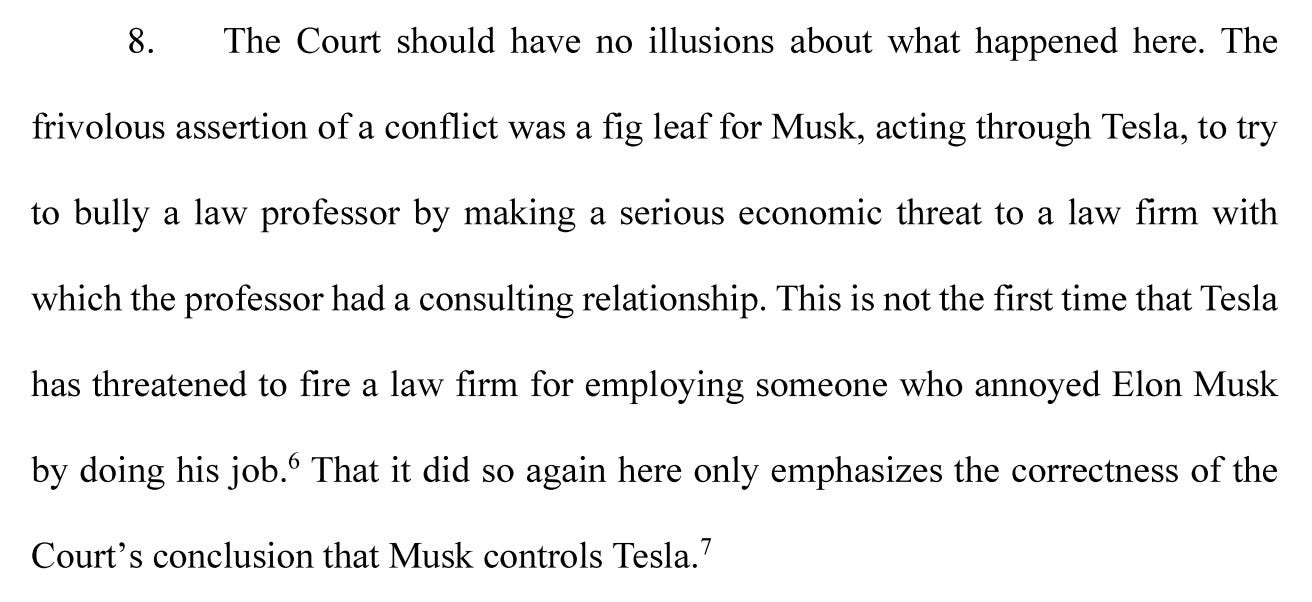The 'Superstar CEO' Is No Match for the Professor
A distinguished Delaware law expert weighs in on Tesla's effort to ratify the outrageous Musk compensation package. Musk fights back, down and dirty. But, it's no contest.
Elon Musk has every reason to dislike Professor Charles Elson. The Professor’s first brief as amicus curiae (friend of the court) in the Tornetta v. Musk case was a pithy tour de force, detailing the history of the practice of awarding key executives stock options to align their interests with those of the shareholders, while in the process undermining the arguments made by Musk and the other Tesla directors in support of the obscene 2018 stock option package. The problem, you see, was that, before the 2018 award was granted, Musk already had an enormous equity stake.
A. Round I: Elson Crushes Musk
Citing Professor Elson at length, Chancellor Kathleen McCormick wrote as follows in this portion of her 200-page January 30 opinion voiding the package (at pages 177-180, footnotes omitted):
But where an executive has a sizeable pre-existing equity stake, there is a good argument that the executive’s interests are already aligned with those of the stockholders. There are many examples of visionaries with large pre-existing equity holdings foregoing compensation entirely: Zuckerberg Bezos, Gates, and others so familiar to the world that no first names are required. In each instance, the CEO’s board recognized that the executive’s preexisting ownership stake provided sufficient incentive to grow the companies that they had built.
***
The principal defect with Defendants’ give/get argument (indeed, their fair price argument as a whole) is that it does not address the $55.8 billion question: Given Musk’s pre-existing equity stake, was the Grant within the range of reasonable approaches to achieve the Board’s purported goals? Or, at a minimum, could the Board have accomplished its goals with less, and would Musk have taken it?
Defendants’ primary response is to reduce the issue to a straw man, stating that “Plaintiff’s allegations boil down to the position that Musk should be happy to work for free.” They make a similar point elsewhere, stating that if Musk “fell short of achieving some or all of the [Grant’s] milestones, the stockholders retained the benefit of any increase in Tesla’s stock price, while Musk risked receiving nothing.” For free? Receive nothing? Defendants’ arguments ignore the obvious: Musk stood to gain considerably from achieving the Grant’s market capitalization milestones (over $10 billion for each $50 billion increase in market capitalization).
The January 30 decision was not the last word in the case. Still to be decided is a pending motion for attorneys’ fees. The plaintiff (Richard J. Tornetta, acting on behalf of Tesla in the “derivative” action) has sought, as the fees for his legal counsel, a small percentage of the 304 million shares of stock that he recovered for Tesla. The briefing on that issue is not yet concluded.
Consequently, notwithstanding the definitive ruling that the 2018 compensation package is void, the Court has not yet ruled on the attorneys’ fee, and so there is not yet a “final” order to end the Court of Chancery proceedings and thereby open the case to an appeal to the Delaware Supreme Court.
B. Musk Initiates Round II, the “Ratification” Effort
On April 17, Musk began publicly orchestrating an effort to escape the consequences of the January 30 decision when his wholly-controlled creature, Tesla, sailed out a lengthy proxy statement, setting a June 13 annual meeting at which shareholders would be asked (among other things) to “ratify” the 2018 stock option award.
(At this point, it is beyond argument that Tesla and its directors are anything but the pliant puppets of Musk. Consequently, I sometimes refer to “Musk” to mean not only Elon Musk, but also Tesla and the lickspittle, captured, and ethically-challenged members of its board of directors.)
I have detailed why I believe the proxy statement is materially misleading (and in comments to a more recent post, MaxedOutMama and jaberwock have added some highly compelling additional reasons). But I am just me, an experienced trial lawyer, to be sure, but in the field of Delaware corporate law, nobody special.
As for Professor Elson, that’s another matter altogether. If he is not the most pre-eminent expert on Delaware corporate law, he certainly shares the very top tier with a very few others.
C. Professor Elson Weighs in for Round II
Professor Elson is back. He is, it is fair to say, notably exercised about Musk’s egregiously greedy attempt to evade the Chancellor’s ruling. Professor Elson made news this week when, after he attempted to file a second amicus curiae brief in the Tornetta case, Musk and his co-defendants tried to stop him by opposing the filing.
(Professor Charles Elson who, unlike Musk, actually knows what he’s talking about)
In the Delaware Court of Chancery, and in every other U.S. court with which I’m familiar, a non-party must first seek the court’s permission before filing an amicus brief. Professor Elson sought such permission in the usual way, by filing a “motion for leave” to do so, attaching to the motion the brief he proposes to file.
D. Musk Steps Into the Ring Again
Musk immediately fired back, writing a letter to the Chancellor arguing that Professor Elson should never have attempted to file his second amicus brief because such a brief will not “provide the Court with any meaningful assistance.” Now, excuse me, please, but that seems rather a dopey strategic move in light of the great assistance with which Professor Elson’s first amicus brief provided the Court. A move, moreover, that is highly unlikely to persuade the Court, and is far more likely to call media attention to the matter. Which, indeed, it has.
Musk did not stop there. He went on to argue that “the issues discussed in [the second amicus brief] are not before the Court…”
That claim is even more laughable. The issues discussed in the second amicus brief are most assuredly already before the Court. And, guess who put them there? Elon Musk, of course. Immediately after publishing the April 17 proxy statement, Musk & Co. wrote to the Court to advise about the proxy, whose “ratification would materially impact these proceedings, including Plaintiff’s [Attorneys’] Fee Petition.” In other recent pleadings, Musk has argued that the Court should hold off on any award of attorneys' fee because if the shareholders vote to ratify the original deal, then the plaintiff will have recovered no stock for the company, and no attorneys’ fee should be awarded.
In other words, Musk himself has put squarely before the Court the issues discussed in Professor Elson’s brief. He has attempted to, in effect, overrule Chancellor McCormick by having Tesla’s shareholders disagree with her before she can enter a final order. A cheeky move, to be sure.
It would have been bad enough had Musk’s efforts to silence Professor Elson stopped with his letter to the Chancellor. But, in a characteristically smash-mouth maneuver, Musk attempted to block the filing of Professor Elson’s second amicus brief by threatening to fire a law firm for which Professor Elson provides consulting services. According to Professor Elson, Tesla’s legal counsel contacted Tornetta’s legal counsel to point out that the law firm (Holland & Knight) represented Tesla in one or more legal matters, and consequently Elson had a conflict of interest.
E. Hey, Ref, Please Stop this Fight & Get Musk Some Medical Help
Professor Elson was not cowed. In order to protect Holland & Knight from economic retaliation, he promptly ended his 30-year consulting relationship with Holland & Knight. He engaged his own legal counsel. And that counsel filed a devastating take-down of Musk, detailing the threat, and making the following powerful points:
Professor Elson was not quite done. It was high time to call out Elon Musk for the snarling bully that he is:
No one steps in it quite like Elon Musk.
F. Further Fun Reading for the Curious
You can read the motion for leave to file Professor Elson’s amicus brief here.
And, for the real fun, you can read the Professor’s proposed amicus brief. It includes several of the arguments I have been making, as well as some I had not considered. I regard its arguments as devastating for Musk and his patently specious ratification effort.
My belief is that the Chancellor likely will grant the motion to file the amicus brief. Even if she doesn’t, she will have to read the brief in order to rule on it. Nice going, Elon.
And, regardless of whether the Chancellor formally has before her Professor Elson’s second amicus brief, most or all of its arguments will surely figure prominently in a ruling that ultimately eviscerates the ratification effort.
That is, of course, if indeed a majority of Tesla shareholder votes finally line up behind ratification. Which, given Musk’s seemingly frantic efforts to lobby for an affirmative vote, seems to be in question.







It appears unlikely that Musk's attempt at self-enrichment will succeed in the Delaware courts, even if it is ratified by shareholders.
What about the move to Texas? How do you think that vote will go?
In a previous post (?I think?), you commented that the NHTSA findings on Autopilot/FSD nearly reach the level of criminal culpability. For the sake of argument, lets say they do.
In that event, where does this leave Ms. Robyn Denholm? Any chance she could find herself in a set of bracelets provided by the Justice Department. 'Accessory to Manslaughter' has a nice ring to it.
The visual of having her frog marched out in bracelets has to be worth something even if the charges are ultimately dropped.